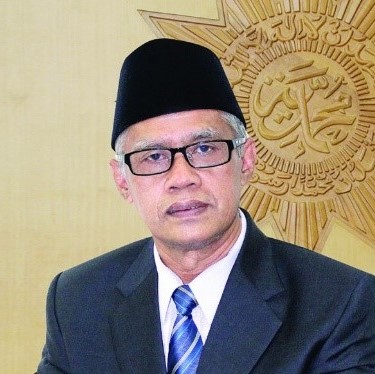Leadership
Dr. Haedar Nashir

Haedar’s leadership within Muhammadiyah started in 1983 when he was trusted as the Chairperson of Muhammadiyah National Student Association. His career kept flourishing, and Haedar was appointed as Deputy of Muhammadiyah Youth (1985-1990), Secretary of Muhammadiyah Central Board (2000-2005), Chair of Muhammadiyah Central Board (2005-2015), and Chairman of Muhammadiyah Central Board (2015-present). In addition to leading the Muhammadiyah organization, Haedar is also Professor of Sociology, lecturing in the Islamic Political Doctoral Program at the Muhammadiyah University in Yogyakarta. He is also a prolific writer and a prominent public intellectual, regarded as the voice of reason through his publications in various scientific papers, books and articles, aside from serving as the Editor in Chief of Suara Muhammadiyah magazine.
Among his recent lectures and publications are:
- Muhammadiyah and the Presence of Progressive Islam in Indonesia. Public lecture held in NTU-Singapore, 2017; Monash University-Australia, 2018; Jawaharlal Nehru University-India, 2018.
- Religion and Globalization: Challenges and Responses. Congress of Leaders of World and Traditional Religions, Kazakhstan, 2018.
- Bridges of Peace: Religions and Cultures in Dialogue, “The New Frontiers of Living Together”. Italy, 2018.
- Peace with no Borders No One Should Ever Be Excluded: The Message of Islam for All. Spain, 2019.
Founded in 1912, long before the independence of Indonesia in 1945, Muhammadiyah has been contributing for resolutions to structural asymmetry as well as direct and epistemic violence in the country for more than a century. Practicing its role to support and maintain the value of humanity, liberation, and emancipation, Muhammadiyah also puts its emphasis on the equality of gender by establishing woman’s organization Aisyiyah in 1917, to institutionalize women’s participation of Muhammadiyah in serving the nation and the world. Aisyiyah emphasized women’s rights to education, economy, and politics. The organization’s support for female leadership from 1978 also predated wider national debate on the topic in the 1990s, and by 1999 Aisyiyah had publicly endorsed the idea of a female leader of the national government. Aisyiyah has been noted for early action in modern Indonesia’s civil society as the first Muslim women’s organization in the country through promotion of women’s literacy at a time when most population remained illiterate.
Currently Muhammadiyah and Aisyiyah run 172 colleges and universities including Universiti Muhammadiyah Malaysia in Perlis-Malaysia; more than 22,000 pre-school and kindergartens; 6,000 primary-to-secondary schools including Muhammadiyah Australian College in Victoria-Australia; 119 hospitals; some 400 clinics, orphanages, service units for senior citizen and disability groups, and various community-based economic empowerment programs that serve diverse citizens without discriminating their religious and racial backgrounds. With approximately 40 million followers and supporters throughout the Indonesian archipelagos, and now with 29 special international branches and sister organizations in more than 40 countries –and counting—, Muhammadiyah is gaining wider international recognition and reputation. In addition to the strategic participatory roles in the country, Muhammadiyah also expands its role in international arenas: permanent consultative members of ECOSOC, member of World Health Organizations (WHO), International Contact Group (ICG), Buddhist-Muslim Forum (BMF), with collaborations with various international FBOs, CSOs, and governmental bodies.